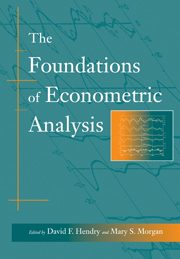Book contents
- Frontmatter
- Contents
- Preface
- Acknowledgements
- Introduction
- Bibliography
- I The Emerging Role of Econometrics in Economics
- II Early Time-Series Analysis
- III Applied Econometrics and the Identification Problem
- IV The Evolution of Statistical Thinking in Econometrics
- V Dynamic Models
- VI The Tinbergen Debate
- 33 Statistical Testing of Business Cycle Theories: A Method and its Application to Investment Activity (League of Nations, Geneva, 1939, vol. I, pp. 34–43, 47–64)
- 34 Professor Tinbergen's Method (Review of Tinbergen (1939), vol. I, Economic Journal vol. 49, 1939, pp. 558–68)
- 35 Mr Keynes on the Statistical Verification of Business Cycle Theories (unpublished, 1940)
- 36 Econometric Business Cycle Research (Review of Economic Studies, vol. 7, 1940, pp. 73–80)
- 37 Autonomy of Economic Relations (League of Nations Memorandum, 1938) and J. Tinbergen's reply (both unpublished)
- VII Structure and Simultaneity
- VIII The Probabilistic Revolution
- IX Exogeneity
- Index
37 - Autonomy of Economic Relations (League of Nations Memorandum, 1938) and J. Tinbergen's reply (both unpublished)
Published online by Cambridge University Press: 05 June 2012
- Frontmatter
- Contents
- Preface
- Acknowledgements
- Introduction
- Bibliography
- I The Emerging Role of Econometrics in Economics
- II Early Time-Series Analysis
- III Applied Econometrics and the Identification Problem
- IV The Evolution of Statistical Thinking in Econometrics
- V Dynamic Models
- VI The Tinbergen Debate
- 33 Statistical Testing of Business Cycle Theories: A Method and its Application to Investment Activity (League of Nations, Geneva, 1939, vol. I, pp. 34–43, 47–64)
- 34 Professor Tinbergen's Method (Review of Tinbergen (1939), vol. I, Economic Journal vol. 49, 1939, pp. 558–68)
- 35 Mr Keynes on the Statistical Verification of Business Cycle Theories (unpublished, 1940)
- 36 Econometric Business Cycle Research (Review of Economic Studies, vol. 7, 1940, pp. 73–80)
- 37 Autonomy of Economic Relations (League of Nations Memorandum, 1938) and J. Tinbergen's reply (both unpublished)
- VII Structure and Simultaneity
- VIII The Probabilistic Revolution
- IX Exogeneity
- Index
Summary
Introduction
The present memorandum has been written rather hurriedly, and the text is therefore not as carefully polished as it ought to be in a manuscript ready for publication. It should, however, be clear enough to bring out my point of view.
The present memorandum does not discuss details of the various equations which Tinbergen has obtained and whose coefficients he has determined statistically. My main concern has been to discuss what equations of this type really mean, and to what extent they can be looked upon as ‘A Statistical Test of Business Cycle Theories’. (The title of one of the volumes which Tinbergen has presented for discussion.)
My conclusion is that the work which Tinbergen is now presenting is of paramount importance, perhaps the most important single step forward in Business Cycle Analysis of recent years. But I do not think that it can be looked upon as ‘A Test of Business Cycle Theories’. The question of what connection there is between the relations we work with in theory and those we get by fitting curves to actual statistical data is a very delicate one. I think it has never been exhaustively and satisfactorily discussed. Tinbergen in his work hardly mentions it. He more or less takes it for granted that the relations he has found are in their nature the same as those of theory.
- Type
- Chapter
- Information
- The Foundations of Econometric Analysis , pp. 407 - 424Publisher: Cambridge University PressPrint publication year: 1995
- 9
- Cited by



